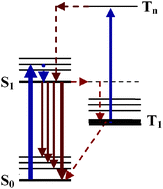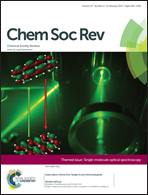Single-molecule photophysics, from cryogenic to ambient conditions
Abstract
We review recent progress in characterizing and understanding the photophysics of single molecules in condensed matter, mostly at cryogenic temperatures. We discuss the central role of the triplet state in limiting the number of useful host–guest systems, notably a new channel, intermolecular intersystem crossing. Another important limitation to the use of single molecules is their photo-reactivity, leading to blinking of the fluorescence signal, and eventually to its loss by photo-bleaching. These processes are at the heart of modern super-resolution schemes. We then examine some of the new host–guest systems recently discovered following these general principles, and the mechanisms of spectral diffusion and dephasing that they have revealed. When charges are injected into organic conductors, they get trapped and influence single molecules via the local fields they create in the material, and via their coupling to localized vibrations. Understanding these processes is necessary for better control of spectral diffusion and dephasing of single molecules. We finally conclude by giving some outlook on future directions of this fascinating field.

- This article is part of the themed collection: Single-molecule optical spectroscopy

 Please wait while we load your content...
Please wait while we load your content...